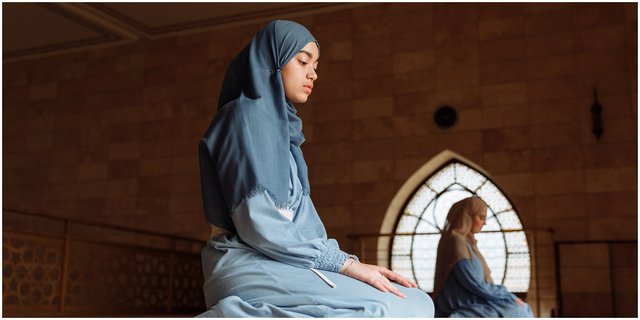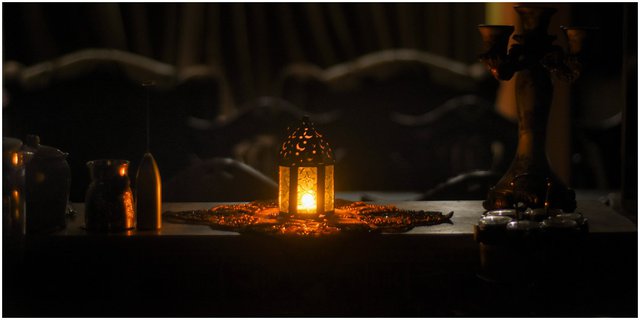Dream - Laylat al-Qadr occurs in the last 10 days of Ramadan. During this moment, Muslims strive to seize the highly special night by performing various righteous deeds, such as reciting the Quran and observing itikaf in the mosque.
However, for a woman who is menstruating, she is unable to perform these acts of worship. So, does a menstruating Muslim woman have no chance of receiving rewards and other virtues on Laylat al-Qadr?
Dear Dream readers, there is no need to worry. A menstruating woman can still have the opportunity to earn rewards on Laylat al-Qadr by performing other righteous acts outside of prayer, reciting the Quran, and observing itikaf in the mosque.
Here are some acts of worship that can be performed by a menstruating Muslim woman on Laylat al-Qadr to still receive rewards, as compiled by Dream from various sources.
Muslim Woman's Practice during Menstruation on Laylat al-Qadr
Remembrance (Dhikr)
The first practice that can be done is remembrance (dhikr). This is explained by Nihayatuz Zain Syekh Nawawi Banten that there are three levels to attain nobility on Laylat al-Qadr as follows:
There are three levels to revive Laylat al-Qadr. The highest level is to revive Laylat al-Qadr through prayer. The medium level is to revive Laylat al-Qadr through remembrance (dhikr). The lowest level is to perform the congregational Isha and Fajr prayers."
Therefore, remembrance (dhikr) falls into the second level to attain nobility on Laylat al-Qadr and is recommended to be done by menstruating Muslim women.
Sending Blessings upon the Prophet (Salawat)
In addition to remembrance (dhikr), menstruating women are also encouraged to send blessings upon the Prophet (salawat). By sending blessings upon the Prophet, Dream readers will find inner peace, be illuminated by the light of faith, mercy, and blessings, and their prayers will be answered by Allah SWT. They will also develop noble character. Sending blessings upon the Prophet can be done by menstruating women at any time.
Listening to the Recitation of the Quran
Another practice that can be done by a menstruating Muslim woman is listening to the recitation of the Quran. This is because a menstruating woman is not allowed to recite the Quran.
In addition to receiving rewards while reciting it, the person who listens will also receive rewards. As explained in the following hadith:
"Whoever recites a letter from the Book of Allah, then he will receive one good deed as ten good deeds like it, I do not say that Alif Lam Mim is one letter, but Alif is a letter, Lam is a letter, and Mim is a letter." (Narrated by Tirmidhi 2910 and authenticated by al-Albani).
So, a person who listens to the recitation of the Quran will still receive the same rewards as the one who recites it.
Charity (Sadaqah)
For menstruating Dream readers who want to receive rewards and other virtues on Laylat al-Qadr, they can do so by giving charity. Even the virtues of that night can also be obtained by the person receiving the charity.
The charity given does not have to be in the form of money, but can also be in the form of providing iftar meals and helping orphans.
Praying abundantly
A menstruating woman is encouraged to pray abundantly on Laylat al-Qadr. The purpose of this prayer is to seek blessings and forgiveness from Allah SWT. Considering that on that noble night, the angels come down to earth and witness the deeds of human beings. Moreover, on that night, Allah SWT greatly loves His servants who pray. Insha Allah, Dream readers will still receive its virtues.
Reading Books on Islamic Culture
Menstruating Dream readers can spend Laylat al-Qadr by reading books on Islamic culture or attending Islamic studies. Culture is a reflection of life that shapes personal character and guides one's journey of life.
Indeed, seeking knowledge during menstruation is the best solution to still receive rewards from Allah SWT. As explained in the following hadith:
“Verily, the prophets do not inherit dinar and dirham, they only inherit knowledge, so whoever takes it, he has taken a great portion.” (HR.Abu Dawud & Tirmidzi).
Supplication on Laylat al-Qadr
The wife of the Prophet Muhammad, Aisha, once said:
"I asked the Messenger of Allah, 'If I knew which night is Laylat al-Qadr, what should I say?' He replied: 'Say: O Allah, You are the Forgiver and You love forgiveness, so forgive me.'" (Narrated by Tirmidhi)
Disclaimer: This translation from Bahasa Indonesia to English has been generated by Artificial Intelligence.












